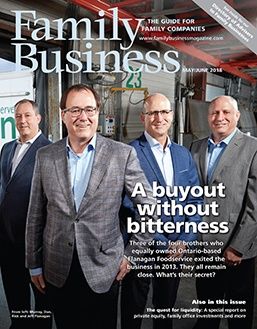START YOUR FREE TRIAL
GET STARTED
The Industry’s Most Trusted Private Wealth Data—Comprehensive, Accurate, and Current
Explore the leading platform used by asset managers to find and engage with RIAs, Broker-Dealers, Family Offices, Foundations & Endowments. Request your free trial of FINTRX now and see for yourself.
Blog & Resources
NEWS AND INSIGHTS FROM FINTRX
FINTRX CEO Featured In Family Business Magazine
Family Offices: 'Quiet Capital'
 Private equity and strategic buyers aren’t the only ones courting family-owned businesses these days.
Private equity and strategic buyers aren’t the only ones courting family-owned businesses these days.
Family offices—the often discreet entities created to manage the wealth of ultra-high-net-worth families—are increasingly stepping in as buyers, quietly seeking opportunities to invest in privately held, family-run companies.
“Families that have built and grown successful businesses are increasingly looking for opportunities to invest in [other] family-owned businesses,” says Irene Mello, Director of the Direct Investing Network at Family Office Exchange (FOX), a network for wealthy families and their family offices.
This trend reflects a broader shift in how family investment firms are allocating capital. Over the past two years, there’s been a marked rise in direct investments from family offices into operating businesses—a strategy that allows for greater control, better alignment of values, and the potential for long-term growth.
“We’ve seen a significant increase in direct investment activity from family offices,” notes Russ D’Argento, Founder & CEO of FINTRX.
According to FOX’s 2017 Global Investment Survey, 57% of family offices reported some level of involvement in direct investments in operating businesses. Many of these transactions target companies with enterprise values under $ 1 billion—typically privately held, and often family-owned.
Several factors are driving this surge in direct investment:
+ Disillusionment with traditional private equity models: Many family offices are increasingly dissatisfied with the “2-and-20” fee structure (2% management fee and 20% performance fee) common in private equity.
+ Internal sophistication: Today’s family offices are highly professionalized, with institutional-grade teams capable of evaluating and executing complex transactions.
+ Attractive fundamentals: Family-owned companies tend to offer strong cash flow, long-term vision, and stable governance—qualities that align well with family office investment goals.
+ Public market challenges: “Because public markets are so efficient, it’s harder to uncover meaningful growth opportunities,” explains Bobby Stover, EY’s Americas Family Office Leader. “Privately held businesses offer better upside potential.”
As more family offices look to preserve and grow their wealth through strategic direct investments, family-owned businesses will increasingly find these firms knocking—quietly, but with serious intent.
Written by: Renae Hatcher |
May 25, 2018
Renae Hatcher is a member of the marketing team at FINTRX - focused on delivering targeted & relevant family office and registered investment advisor content to our subscribers.
Similar Content
COMPANY
COMPARE US

Copyright © 2025 FINTRX, Inc. All Rights Reserved. 18 Shipyard Drive Suite 2C Hingham, MA 02043 Data Privacy Policy
.png?width=367&height=109&name=ezgif.com-gif-maker%20(3).png)

